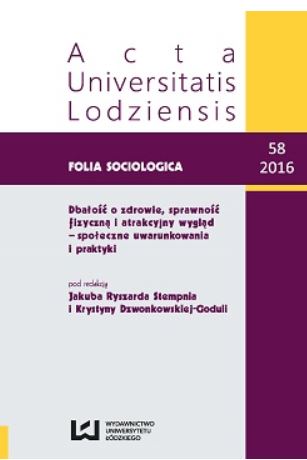Telewizja, słodycze i zdrowie. O sprawczości dzieci i napięciach w praktykach życia codziennego w kontekście programów promocji zdrowia
Television, sweets, and health. On children’s agency and tensions in everyday life practices in the context of health promoting programmes
Author(s): Magdalena Radkowska-WalkowiczSubject(s): Social Sciences, Sociology, Health and medicine and law, Family and social welfare
Published by: Wydawnictwo Uniwersytetu Łódzkiego
Keywords: health;children;childhood studies
Summary/Abstract: In this text I present the results of research conducted as part of the project “Health in the opinions of children – childhood studies perspective” conducted by the Interdisciplinary Team for Childhood Studies at the University of Warsaw. The main goal of the project is to uncover the meanings young children (between 8 and 11 years of age) attribute to health, or the lack of it. I show how children, as social actors, cope with the modern demands regarding the body and their own new position as being responsible for passing knowledge about good eating habits and healthy lifestyles. I also present children’s definitions of health and their understanding of unhealthy behaviour. One of the main subject of children’s stories, next to the rather obvious associating health with sports, and eating fruits and vegetables, turned out to be the TV set, computer and other electronic devices. There-fore I ask about the meaning children give to media in the context of health. I focus on how they connect them to health, and on what linking the practice of TV watching with the subject of health tells us about the concepts of health and body. I also show how including television, computers and tablets in the health discourse is a result of a non-dualistic understanding of the body by children. For children health is inextricably linked to morality, education, and aesthetics. Even though the interviewed children adopt many of the narrations on health distributed by the educational institutions, and they seem to know how to eat and live healthy, they create health narrations of their own and on their own grounds. On one hand they are submissive receivers of the health promoting programmes (they know what is healthy), but on the other hand they stay members of their children’s tribe, who realize their childhood by practicing what is considered unhealthy and “non-adult”. The research gives us a picture of a divided child. A child that knows what to do to be healthy, but at the same time doing “unhealthy” things, which is allowed by the status of being a child.
Journal: Acta Universitatis Lodziensis. Folia Sociologica
- Issue Year: 2016
- Issue No: 58
- Page Range: 119-133
- Page Count: 15
- Language: Polish

